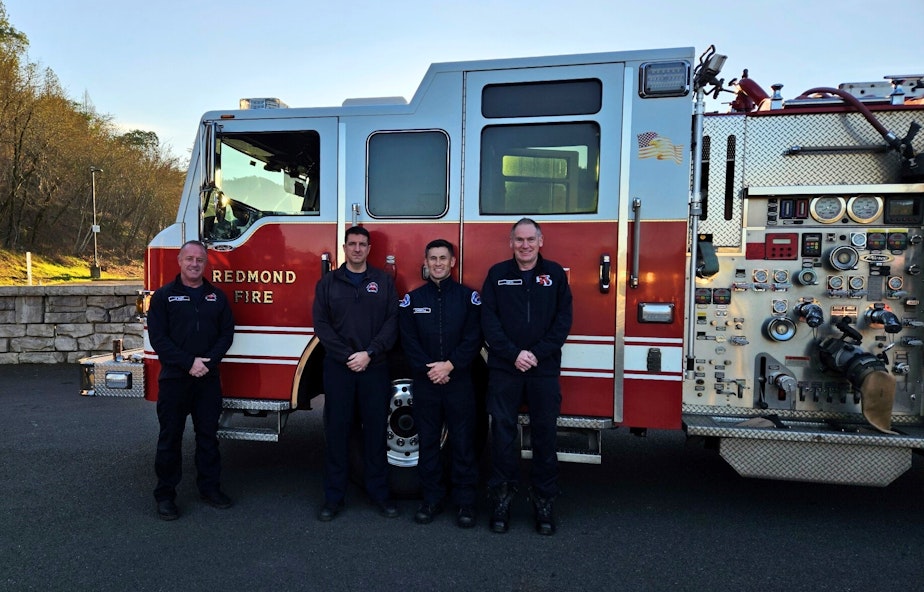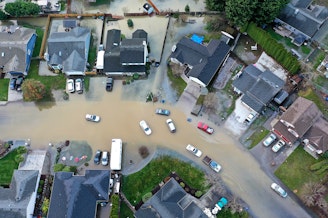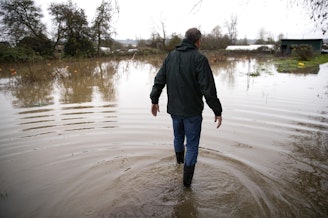Redmond firefighters felt tug on heart strings to help fight L.A. fires

Multiple teams of Washington-based firefighters are helping fight the wildfires in Los Angeles. Jeff Carroll is with the Redmond Fire Department. KUOW’s Rob Wood talked to him for this update.
This interview has been edited for clarity.
Rob Wood: Tell us about the team you're with.
Jeff Carroll: We're one rig out of Redmond, so there are four of us, but we're part of a task force with four to five other engines. We're assigned to the Palisades Fire. It's the biggest one right now.
Can you tell us what you first experienced when you got there?
I mean, it's pretty devastating. There was a lot of destruction going on previously before we got down here. Everybody's trying to get their feet underneath them. We spent a couple nights out on the line doing structure protection and calling in airstrikes, just doing the best we can.
Sponsored
Can you give us a description of just the things that you saw when you guys got there?
There are a lot of crews, a lot of support. The terrain is really, really steep, so it's difficult to fight the fires correctly. But they have the crews out there now, with air support. It's actually really good. There are a lot of line crews out there, cutting line, just trying to contain the fire. They're doing a great job.
It came through here pretty bad. Whole blocks are destroyed, but the city is rallying. They're fighting. Any natural disaster, everybody kind of bonds together, so it's a good feeling. Just everybody wants to help and do the best they can.
What is it like, the feeling in the air there? Is it making it very difficult to do your work?
The first night that we were on the line, it was pretty smoky, pretty ashy. So it was pretty difficult. We were up all night, just making sure the fire line was staying stable, not crowding any houses. But depending on where the wind blows, it gets pretty dark.
Sponsored
What sort of tasks have you been working on so far?
We're an engine, so we're mostly responsible for structure protection. We'll man a neighborhood and some houses and make sure that around that house is safe, removing all fire hazards, and then basically patrolling that area to make sure the fire doesn't approach those houses.
How different is this from the types of fires that you've fought in the past?
It's wildland, and there are structures involved. Redmond is a little more dense as far as a different terrain. So this is a little different. I mean, a fire is a fire, but this one's big.
A lot of Seattleites seem to know someone who's been affected by the fires down there. Do you have any personal connection, friends or family who've been impacted?
Sponsored
I do have friends and some family in California. They've been supportive, knowing that we're down here. And the community all around has been great, from everywhere we've been and just even driving down. It's been very supportive.
Is there a story or a moment that stands out to you from your time down there so far?
You know, we've been going and going. There hasn’t honestly been much time to even process it all. We’re just trying to do the job and just doing what the city needs us to do.
Can you give us an idea of what your day is like? When do you get to sleep? When do you get to eat? When are you out on the lines, and for how long?
That’s very intermittent. We pulled, I think, 36 hours on the line. It's day and night, because you're watching, making sure that the fire is not moving. The wind picks up, so it's very volatile. It moves pretty quick. I think yesterday was the first day we got a little bit of rest, about 12 hours, but we were back on the line this morning. We'll be here through tonight, and hopefully it depends on when we'll get relieved tomorrow.
Sponsored
Why do you and your fellow firefighters choose to do this work?
I can speak for myself, not my counterparts, but I believe most of us just do it because-- we were talking on the ride down here-- it's the right thing to do. We all kind of felt the tug on our heart strings to help out, and seeing people struggle. It's kind of what we do. And part of it, too, being selfish, it's an experience that not many people get to do.
Listen to the interview by clicking the play button above.





